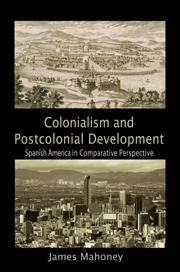Book contents
- Frontmatter
- Contents
- List of Tables, Figures, and Maps
- Preface
- 1 Explaining Levels of Colonialism and Postcolonial Development
- 2 Spain and Its Colonial Empire in the Americas
- 3 Mercantilist Colonialism
- 4 Liberal Colonialism
- 5 Warfare and Postcolonial Development
- 6 Postcolonial Levels of Development
- 7 British and Portuguese Colonialism
- 8 Conclusion
- Notes
- Glossary
- Select Bibliography of Works on Colonial Spanish America
- Index
- Titles in the Series
8 - Conclusion
Published online by Cambridge University Press: 05 June 2012
- Frontmatter
- Contents
- List of Tables, Figures, and Maps
- Preface
- 1 Explaining Levels of Colonialism and Postcolonial Development
- 2 Spain and Its Colonial Empire in the Americas
- 3 Mercantilist Colonialism
- 4 Liberal Colonialism
- 5 Warfare and Postcolonial Development
- 6 Postcolonial Levels of Development
- 7 British and Portuguese Colonialism
- 8 Conclusion
- Notes
- Glossary
- Select Bibliography of Works on Colonial Spanish America
- Index
- Titles in the Series
Summary
“There is no doubt that a large number of structural features of economic underdevelopment have historical roots going back to European colonization,” writes Paul Bairoch in Economics and World History. The view that colonialism left behind an underdeveloped periphery is widely held among theorists of world capitalism. Notwithstanding the patently objectionable purposes of colonialism, however, the countries that were born out of this traumatic experience now have remarkably diverse levels of development; they include some of the richest countries in the world as well as some of the poorest. Efforts aimed at explaining how colonialism universally led to the underdevelopment (or development) of its recipients seem ill conceived. The more appropriately targeted task is to adequately conceptualize variations in colonization, and then identify the causes and consequences of those variations in ways that can stand up against fine-grained evidence from the historical record.
This book has sought to carry out this task. It has argued that one must pay attention to, as an orienting centerpiece, variations in levels of colonialism, defined as the extent to which people and institutions from a colonizing nation are implanted in a colonized area. Differences in levels of colonialism are worthy of explanation in their own right, for they capture crucial contrasts in colonialism itself as a historical phenomenon. They also command attention by virtue of their role as causes of long-run development.
- Type
- Chapter
- Information
- Colonialism and Postcolonial DevelopmentSpanish America in Comparative Perspective, pp. 253 - 270Publisher: Cambridge University PressPrint publication year: 2010



